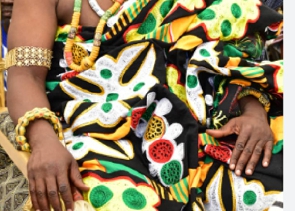The chiefs of Akyempim Traditional Area of the Central Region have called on the Minister of Chieftaincy and Religious Affairs, Stephen Asamoah Boateng, to honour a promise he made to ensure that the Chieftaincy Act is repealed.
That, they said, would enable them to handle some issues in their communities effectively.
Nana Adubua Atta II, Nyimfahen of Akyempim Traditional Area, made the call at a durbar to commemorate the maiden Ahobaakese Festival.
It is celebrated by Andam Mba Nyimfa Division of the traditional area at Gomoa
Oguaa, a community in the Gomoa West District.
The event, on the theme: “Remembering the Heroism of Egya Ahor”, was well attended by chiefs, queen mothers and their kinsmen from 13 towns, constituting the Andam Mba Nyimfa Division of the Gomoa Akyempim Traditional Area.
The festival was to school the public on the reasons for the celebration of the Ahobaakese, and learn lessons from the citizenship spirit exhibited by Egya Ahor, their forefather, in saving his people.
Nana Atta, who presided, said the 1992 Constitution was silent on how chiefs should execute their mandate as custodians of the land to improve the living standards of their community members.
“If the Act is repealed, it will go a long way to help reclaim our integrity and use such powers to ensure that sound justice and tranquility prevail in our catchments areas, rather than for
people to continue seeking redress at the shrines,” he said.
The Chief appealed to Mr Bismark Baisie Nkum, the Gomoa West District Chief Executive, and Mr Richard Gyan-Mensah, the Member of Parliament for Gomoa, to use their good offices to work towards renaming the Gomoa Dawurampong Senior High School (SHS) to “Egya Ahor SHS to honour the late chief priest.
Nana Atta revealed that some acres of land had been reserved around the clinic at Gomoa Oguaa for its up-grade into a hospital, since the population had grown.
He emphasised the need for the DCE and MP to champion such a course to prevent their constituents from travelling longer distances, through deplorable roads, to seek health care services.
Nana Odeasempa Yaw Tawiah III, Beamuhen of Gomoa Akyempim Traditional Area, and
the Odikro of Gomoa Kumasi, who schooled the gathering on the significance of the Ahobaa Festival, said the Gomoa people, led by Nana Gomoa, were part of the larger Akan Tribe, who migrated from the old Ghana Empire (Mesopotamia), due to some disturbances, to Takyiman and later arrived at the southern part of Ghana.
On their arrival, an epidemic broke, which killed several people each day, and the leaders consulted their gods, who asked for human sacrifice.
“Egyaa Ahor, the Chief Priest, volunteered, and he was sacrificed. And that ended the epidemic, hence the need for us to emulate his example, by dedicating and sacrificing ourselves for sound and total development of our localities,” he indicated.
That brought about the name; Ahobaa Festival.
Nana Dantse II, Odikro of Gomoa Oguaa, commended the chiefs and people of Adam Andam Mba Nyimfa Division for participating
in all activities of the festival, to ensure success.
He expressed the hope that subsequent Ahobaakese festivals would be well attended to forge unity and enhance development of the traditional area.
Click to view details



General News of Saturday, 19 August 2023
Source: GNA

















